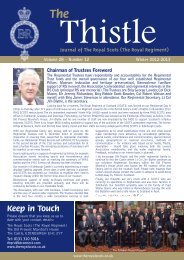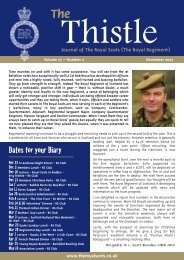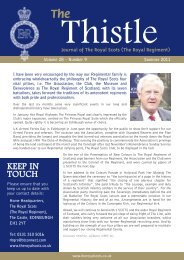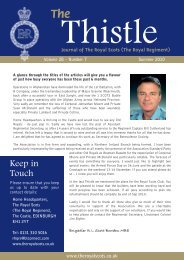Dates for your Diary - The Royal Scots
Dates for your Diary - The Royal Scots
Dates for your Diary - The Royal Scots
You also want an ePaper? Increase the reach of your titles
YUMPU automatically turns print PDFs into web optimized ePapers that Google loves.
As We Were<br />
As the final act of the 350th Anniversary activities a time<br />
capsule containing various documents was sealed and<br />
placed in the vaults of <strong>The</strong> Bank of Scotland with the<br />
intention that it should be opened on the 400th<br />
Anniversary. In the event <strong>for</strong> obvious reasons it was<br />
opened on our 373rd birthday and the documents<br />
distributed early to the intended recipients. In the bottom<br />
of the box was a letter from the late Colonel Bill Fargus of<br />
which the following is an extract:<br />
“As the capsule is sealed, I have a memory of <strong>The</strong> <strong>Royal</strong> <strong>Scots</strong><br />
dating back 60 years, starting at Aldershot in 1923 where my<br />
father was 2IC of the 2nd Battalion. We lived in Wellesley<br />
Road, and I clearly remember being taken by my governess<br />
to see a CO’s parade in Goojerat Barracks, and to see my<br />
father’s charger “Fusilier” and give him some sugar. Later I<br />
lived at Glencorse Barracks, Maryhill Barracks, Glasgow and<br />
Talavera Barracks, Aldershot until my father retired as CO of<br />
the 1st Battalion in 1933.<br />
<strong>The</strong>re was then a 4 year gap until I was commissioned.<br />
I served in the Regiment from 1938 until retirement in 1973<br />
and subsequently <strong>for</strong> 10 years, until 31 August 1983, was<br />
firstly Assistant Regiment Secretary and then Regimental<br />
Secretary at Regimental Headquarters in Edinburgh Castle.<br />
I should like to record a few thoughts and memories,<br />
covering those 60 years, first of <strong>The</strong> <strong>Royal</strong> <strong>Scots</strong>, and then of<br />
Army Life in general.<br />
I spent most of the war with the 8th Battalion, who were quite<br />
magnificent. I came home from Hong Kong in mid 1941, and<br />
after a year instructing at an Officer Cadet Training Unit in<br />
Dunbar was posted to the 8th Battalion and soon became<br />
Adjutant, a post I held throughout the NW Europe campaign.<br />
We trained hard, under Lt Col “Jumbo” Delacombe. He was<br />
ruthless and a martinet. We did not like him, but he did a<br />
wonderful job, and raised the standard of training to such a<br />
pitch that when he was wounded in Normandy in July 1944,<br />
the Battalion survived nearly 5 months, under a totally<br />
incompetent (non-<strong>Royal</strong> Scot) CO, without any disaster<br />
occurring. In 11 months of this campaign, the rifle companies<br />
had 200% casualties. No officer and only one sergeant<br />
survived from Normandy to the end. <strong>The</strong> fighting spirit of the<br />
battalion never flagged. Never once did they fail to capture<br />
their objective; we were the only battalion in the Army who<br />
did assault crossings of the 3 major water obstacles, the<br />
Seine, the Rhine and the Elbe.<br />
It is strange that in my whole career, I only spent 9 months<br />
with the 1st Battalion, commanding a company over a period<br />
which included the ill-fated ‘Suez’ expedition of 1956. <strong>The</strong><br />
general public now believe this to have been a military<br />
failure. This was far from the case. Militarily it was a<br />
complete success, despite being launched by the politicians<br />
at a moment designed to give the army impossible<br />
administrative and logistic problems. It was sad that such a<br />
fine officer as David Pinkerton, undoubtedly destined to be<br />
a General, was killed so unnecessarily.<br />
During my 10 years in Regimental Headquarters from 1973-83<br />
I have seen more of the 1st Battalion than at any time in my<br />
life. This has covered the tenures of 3 Colonels, Bill Campbell,<br />
David Young and Bob Richardson, and 5 CO’s, Nigel Stisted,<br />
Philip Davies, Stuart McBain, Francis Gibb and Mike Ashmore.<br />
<strong>The</strong> battalion has been outstanding throughout this period.<br />
It has been a busy time with seven tours in Northern Ireland,<br />
and two major ceremonial events, the presentation of new<br />
colours by HRH <strong>The</strong> Princess Anne in 1980, and the 350th<br />
Anniversary Review by HM <strong>The</strong> Queen. Both events were<br />
outstanding successes.<br />
But there can have been no more splendid parade that the<br />
Trooping of the Colour, and the firing of a Feu de Joie on 30<br />
June 1983. Colonel Johnnie Johnston, a Grenadier, from the<br />
Lord Chamberlain’s Office came several months in advance,<br />
on behalf of <strong>The</strong> Queen, to approve the <strong>for</strong>mat of the parade,<br />
and said quite openly that he thought we were being overambitious.<br />
But he certainly had to eat his words. <strong>The</strong> Feu de<br />
Joie was the greatest success. Few had ever seen this done<br />
be<strong>for</strong>e, and it was fired with breathtaking precision, and it<br />
sounded all the more impressive with Salisbury Crags behind<br />
as a backdrop. During the review the Queen leant over to<br />
Princess Anne who was sitting beside her, and remarked<br />
“You will never see a better parade than this!”<br />
I cannot help reflecting that in the 45 years since I joined the<br />
Army, more changes must have come about than at any<br />
other time in history. I joined the 2nd Battalion in Hong Kong<br />
in March 1938. Little progress had been made since World<br />
War One. <strong>The</strong> tempo was slow. ‘Professionalism’ in the Army<br />
was non-existent. Apart from about 6 weeks in Camp each<br />
year, and when firing on the range, work stopped at lunch<br />
time, and thereafter time was devoted to fatigues, under<br />
Sergeant Majors, and sport. Wednesday was a whole holiday<br />
each week. But as subalterns we had to dine in Mess five<br />
times a week, wearing Mess Kit on Mondays, Tuesday,<br />
Thursdays and Fridays. <strong>The</strong> Regiment was at this time a<br />
Machine Gun Regiment. We had three companies of Vickers<br />
Guns, and one company, in theory, an Anti-tank company –<br />
but in the absence of anti-tank weapons they were armed<br />
with Lewis Guns. <strong>The</strong> Bren Gun was introduced into the Army<br />
in 1939. We did our first training on the Bren Gun with<br />
Czechoslovakian made guns captured from the Chinese as<br />
they escaped over the border into Hong Kong from the<br />
Japanese.<br />
We had no mechanical transport, no radios and no mortars.<br />
<strong>The</strong> first MT, about 8 trucks, and the first mortars arrived in<br />
1938 and 1939. Movement on exercises was all on foot.<br />
Baggage and stores were carried on mules of the Hong Kong<br />
Mule Corps, with Indian leaders. In the more difficult terrain<br />
we normally had to allot one entire company to mule<br />
leading, the allotment <strong>for</strong> the Battalion being about 180.<br />
<strong>The</strong> signal platoon communicated with signal flags and<br />
heliographs. In static positions cable was laid <strong>for</strong> field<br />
telephones.<br />
A private soldier’s basic pay was 2/- (10p) per day. <strong>The</strong> only<br />
extras he could get were 3d (just over 1p) a day Educational<br />
Proficiency Pay, 3d Military Proficiency Pay and 3d Special<br />
Proficiency Pay. After compulsory stoppages <strong>for</strong> Barrack<br />
Damages and other items, it was rare <strong>for</strong> more than 10/-<br />
(50p) a week to be paid over the pay table.<br />
Since 1900 there has been a ‘Fargus’ serving in or on behalf<br />
of the Regiment <strong>for</strong> 79 years. I now pass on and the only<br />
family connection is my nephew by marriage Ian MacKichan.<br />
I hope his career will be as enjoyable as mine.”










